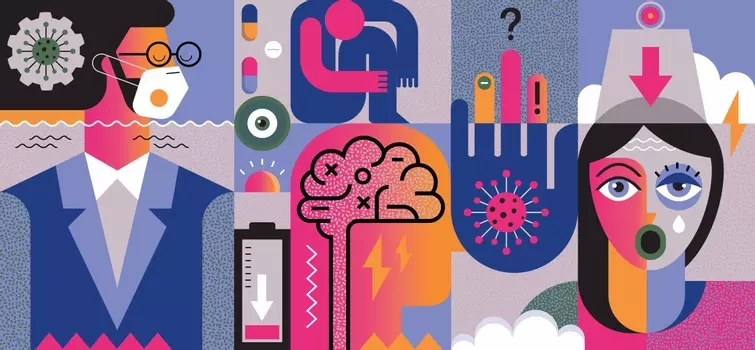What is health anxiety and how can it be overcome?
In this edited excerpt from their book Overcoming Health Anxiety, authors Rob Willson and David Veale explain what health anxiety is, and what tools can be used to tackle it.
Health anxiety is a common condition in which a person often finds themselves worrying excessively about being ill. For some, this is focused on trying to avoid (or detect early) an illness they particularly fear or dread. For others, this can take the form of a belief that they already have a feared disease, but it has not yet been diagnosed. If you have health anxiety, often this fear persists even if you have been reassured by a doctor that they do not believe that you have that disease. Some people with health anxiety fear the notion of becoming ill in general, and others might fear specific conditions (that may change over time).
As well as experiencing significant distress, people with health anxiety may feel compelled to over-monitor and check for signs of disease. They may also be driven to gather considerable information about health and illness, often from the internet. There are individuals who seek repeated medical reassurance and others who avoid seeing a doctor.
Common worries in health anxiety are focused on cancer or serious neurological conditions like multiple sclerosis. You can also be physically ill (for example, have heart disease) but the concerns about the condition are regarded as excessive. Health anxiety is not restricted to physical illness and can include a fear of developing a mental illness like schizophrenia or dementia.
The result of having health anxiety is significant distress and it’s likely you will more easily become worried about the state of your health than average. Your anxiety or related behaviours are likely to be having a serious impact on all important areas of your life.
How common is health anxiety?
Health anxiety occurs equally in both men and women. Studies show that about 6 per cent of the population will develop health anxiety in their lifetime, and that between 1 per cent and 5 per cent will have the condition right now. It’s estimated that about 10 per cent of people attending their family doctor have a diagnosis of health anxiety. A much larger number consult their doctors with symptoms for which there is no known physical cause.
When does health anxiety start?
The onset of health anxiety can come at any age, though it commonly starts in adolescence or in young adults. Some people with health anxiety have an excessive worry about a specific illness, which is usually briefer in duration. However, the usual course of health anxiety is to come and go depending on various life stresses. When it returns, it usually affects a different part of your body. Other people with health anxiety have a more long-term, or chronic, form.
Key things to remember
Health anxiety is a common problem that causes serious levels of distress; you cannot just snap out of it, and it is nothing to be ashamed of. It is not your fault that you have health anxiety. There will be a mix of factors – psychological and biological, as well as social and life experiences – that are pieces in the jigsaw. And, crucially, you can overcome your health anxiety if you follow the right plan.
Cognitive behavioural therapy (CBT)
Learning to apply the principles of a scientifically proven form of psychological therapy called cognitive behavioural therapy (CBT) has been found to be helpful for health anxiety, and thousands of people have used CBT techniques to recover.
Recovery from health anxiety involves developing a more realistic and helpful way of understanding the bodily sensations that you worry about so much. Unfortunately, other emotions associated with health anxiety, such as depression and shame, tend to make your worrying even more powerful. The key is to ‘detach’, to distance yourself from your catastrophic thoughts and to tolerate not knowing for certain. Remember, your brain is trying to keep you safe and will send you lots of warning signals: sometimes we all need to learn when not to listen to warnings.
Behaviour change in CBT refers to changing the way you respond to your bodily sensations and the thoughts or images your mind produces about them. Remember that what you do in your mind, such as mental checking or deliberately recalling a conversation with a doctor, is a form of behaviour or ‘doing’ something.
Effective CBT for health anxiety usually contains the following components, although it may not be necessary to use all of them:
- Understanding the link between physical sensations, thinking, attention, emotion and behavioural components of your own health anxiety.
- Testing out your fears and resisting doing the things you do to try and feel more reassured.
- Practising allowing catastrophic thoughts and images about illness or dying without responding or ‘engaging’.
- Cutting back or stopping ‘monitoring’ your health.
- Becoming aware of unhelpful thoughts and attitudes you have towards illness or death.
- Learning to tolerate uncertainty and reduce excessive responsibility.
- Learning to spot yourself engaging in worrying about your health and to ‘switch’ the focus of your attention to bring your mind back into dealing with real life in the here-and-now.
- Putting time and energy back into things that are important to you so you can improve the quality of your life and reduce the amount of time you spend thinking about your health.
- Developing a balanced plan for taking appropriate care of your health.
- Dealing effectively with the fact that you will one day die, without excessively worrying about it.
Looking at the list above, what do you imagine are likely to be the most important steps for you to take to overcome your health anxiety?




